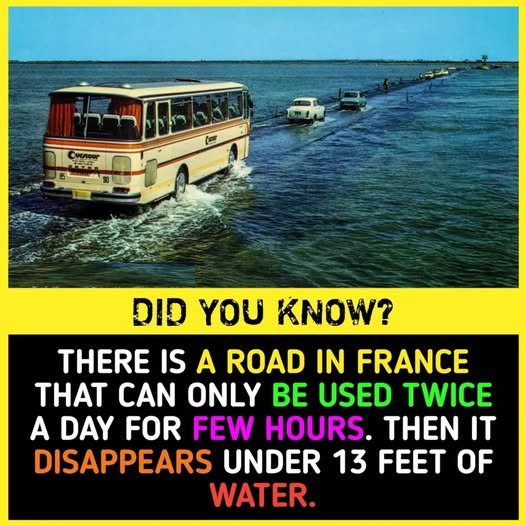Here’s a quick guide and some additional details if you’re curious or planning to visit:
Passage du Gois – Key Highlights
📍 Location
- Connects the mainland of France (near Beauvoir-sur-Mer in Vendée) to the Île de Noirmoutier in the Atlantic Ocean.
📏 Length
- About 4.3 km (2.7 miles) long.
🌊 Tide-Dependent Road
- Accessible only twice a day during low tide—typically for a window of 1.5 hours before and after the lowest tide.
- At high tide, the entire road is completely submerged under up to 4 meters (13 feet) of water, making it impassable and very dangerous.
🚧 Safety & Warnings
- Tide times are clearly posted at both ends.
- There are emergency towers along the road where stranded travelers can climb to wait for rescue if caught by the tide.
- Local authorities strongly advise checking official tide schedules before attempting the crossing.
🚗 Why It’s Famous
- Tourist Attraction: Visitors are drawn by the thrill of driving on a road that disappears twice daily under the sea.
- Photography: It’s incredibly photogenic, especially when the tide is coming in or going out.
- Cycling & Walking: Possible during low tide, though slippery seaweed can make it tricky.
⚠️ Important Travel Tips
- Always check local tide tables (available online or at the tourist office).
- Avoid crossing close to the end of the low-tide window.
- Never attempt to cross when water is starting to cover the road—it rises quickly and unpredictably.
- Consider parking and walking part of the way if you just want the experience without driving the full length.
🏝️ While You’re There: Île de Noirmoutier
- Beautiful beaches, seafood restaurants, salt marshes, and quaint villages.
- Great for biking, especially along the salt flats and coastline.
- The island also has a bridge (built in 1971) as a safer, all-tide access point.



